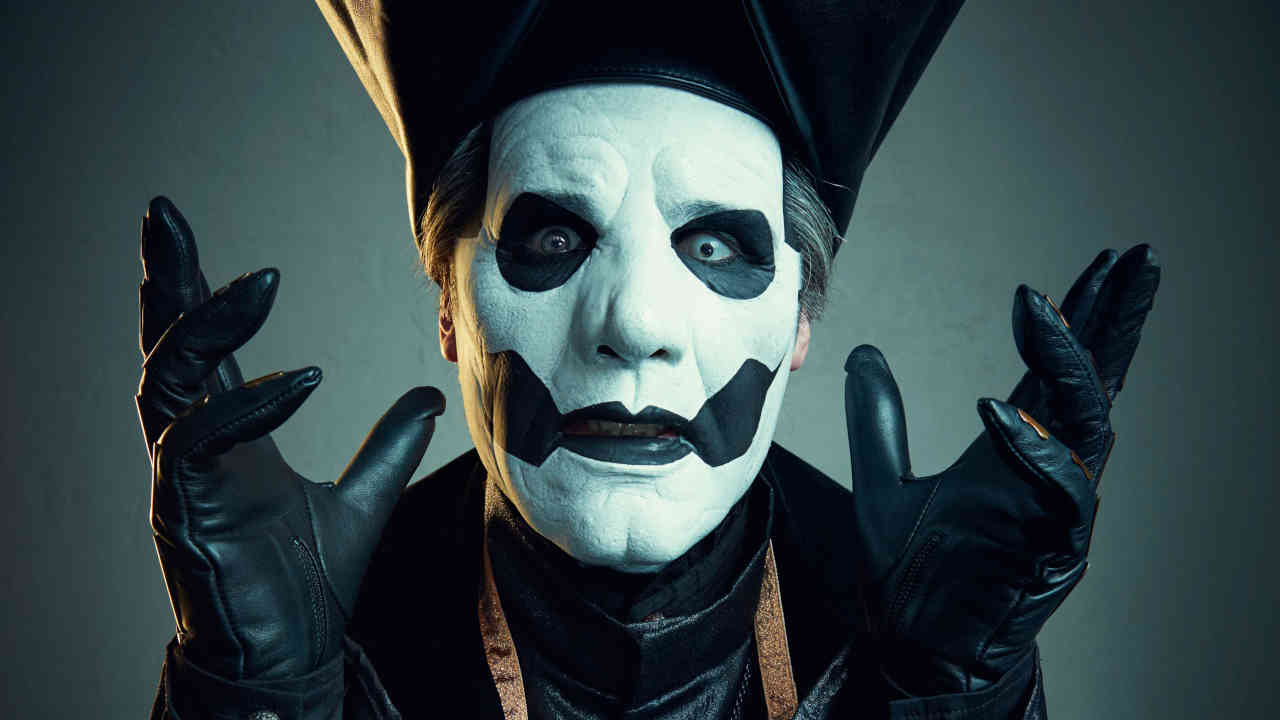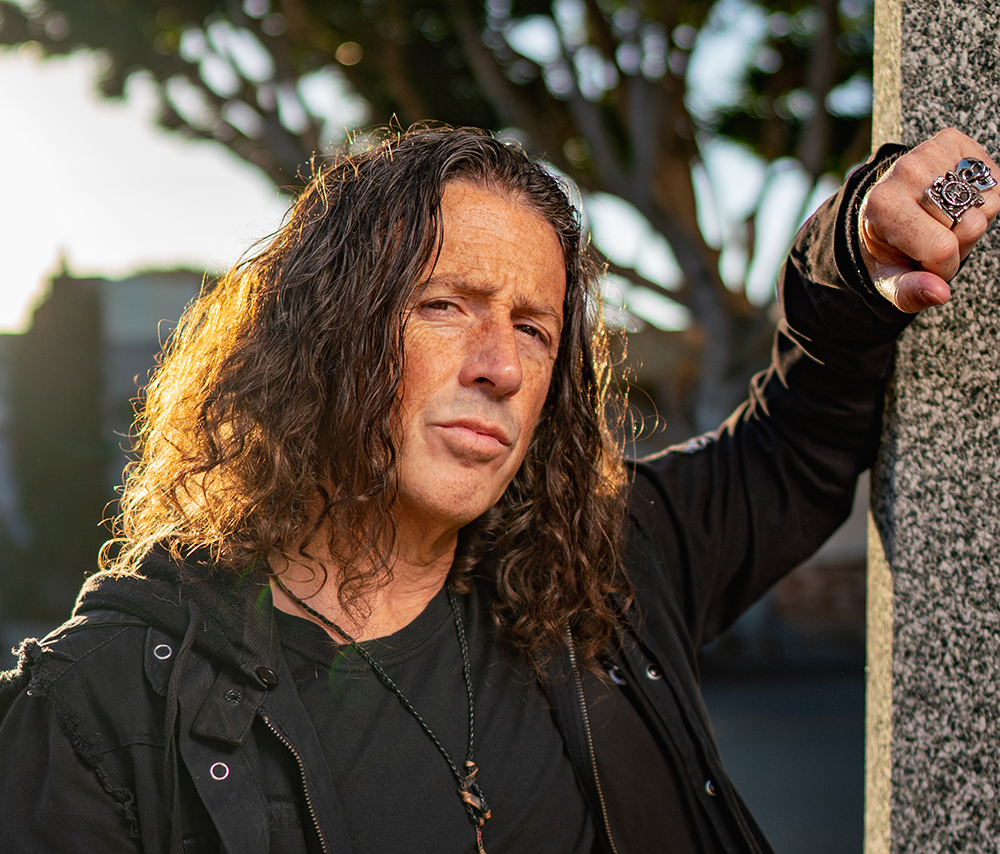We are sitting comfortably at a corner table in the lobby of Seattle’s renowned Edgewater Hotel. The low winter sun drops over Puget Sound as Alexi Murdoch’s ethereal hit, All My Days, wafts softly from the PA. With a high, vaulted wood ceiling, two roaring stone fireplaces and dim lighting emanating from an elk horn chandelier, it feels more like a Canadian hunting lodge than a cosy urban hotel. And save for the two of us, the lobby is empty. The tranquillity is off the goddamned charts.
We’re in the company of Tobias Forge, founder, frontman and all-around visionary of Ghost, and he is well pleased with all this serenity. “I’m a misanthrope,” he laughs. “I like people that I like and I hate others! Ha ha ha! I was like that even before [the pandemic]. If I go to a bar, I want it to be like this, where you can sit and talk.”
Wearing an Iron Maiden raglan baseball shirt and simple black trousers, and with his short, spiky hair, he’s all but anonymous, and certainly aeons away from any of his colourful onstage alter egos. In view of the surging pandemic, when his manager introduced us a few moments ago, we forwent handshakes and instead awkwardly waved to each other from two feet apart. It was the perfect ice-breaker, as neither of us could avoid laughing at the absurdity of the moment. Tobias is exceedingly friendly, he listens intently, and he is at all times highly courteous. This will be his only in-person interview of this tour, and so he’s graciously allotted a generous amount of time for us. Which is ace, because we’ve got a hell of a lot to cover.
Last night, Ghost kicked off their first tour in more than two years in Reno, Nevada – a 26-date co-headlining run with Volbeat, supported by Twin Temple. It was the first time Tobias had stepped onto a stage since Mexico City in 2020 – and he’s still buzzing. “It felt fantastic, seeing people again!” he says. “I’ve hardly been to shows myself during these past couple of years. I went to see Ed Sheeran at this little corporate gig with 500 people, which felt like, ‘Whoa…’. I don’t like big, rowdy places. He did, like, seven songs but it felt like I’d seen four bands. I was like, ‘Fuck, I’m dying. I just wanna get out of here! Ha ha!’”
That we’re talking about Ed Sheeran with the frontman of Ghost is surreal in and of itself, but even more so in this lobby, where the walls are festooned with photos of some of the hotel’s legendary clientele, including The Beatles and Led Zeppelin. The Edgewater Hotel happens to be one of rock’n’roll’s most celebrated way stations (also quite infamous, for those familiar with Zeppelin’s notorious stay here in 1969), frequented by rock’s most important voices throughout the ages. Given the utterly massive year ahead that Ghost have planned, that we are surrounded by rock royalty feels like more of an augury than a coincidence.
Last week, the band announced their new album, Impera, and released lead single Call Me Little Sunshine, which has already notched more than two million streams on Spotify alone. In what’s shaping up to be another massive year for metal, this is an early major splash – and the buzz is real.
Ghost are now one of the most recognisable bands on Planet Earth. Since forming in Linköping, Sweden in the mid-00s, they have steadily ascended the rock and metal ranks with a hyper-addictive blend of late-70s hard rock, old school metal and early-Pink-Floyd-era prog. And they are visually stunning; fronted by a rotation of fiendishly flamboyant anti-Popes named Papa Emeritus (I-IV), as well as a brief stint with Cardinal Copia (all played by Tobias), who’s backed by an anonymous masked band known as the Nameless Ghouls, their profile could only rise. Ultimately, however, it’s the strength of Tobias’s songwriting that continues to drive the band further into the mainstream spotlight. Behind a Grammy win (for Cirice), two other nominations (for Prequelle) and a slew of international accolades, there’s a powerful sense that Ghost are only just getting started. So it’s fair to say that expectations for Impera are high – perhaps impossibly so.
But if Tobias is anxious about the new album’s reception, it doesn’t show. It might be four years since he’s released new music and two since he’s performed live, but what’s most important to him is that he’s excited. “There were several things on the record that, every time I heard them, I was like, ‘Fuck yeah! This feels cool.’ Like, we’d listen to Spillways or Kaisarion or Twenties, it’s like, ‘Oh yeah!’ Every time I hear Spillways it makes me happy. It’s a very dance-friendly song. The process is filled with lots of nice bits. Is the whole thing tasty? I don’t know. It’s a 10-course meal. If you don’t like oysters, then you might not like course number four because that’s got oysters.”
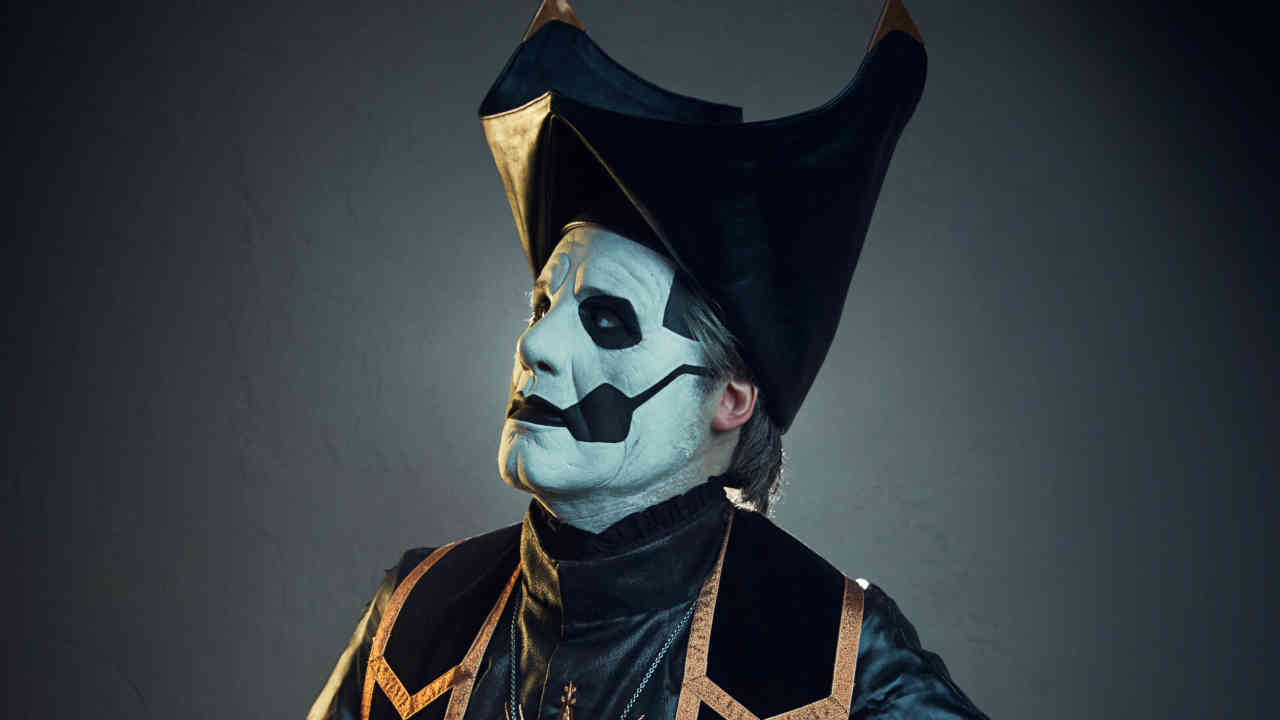
We’re dying to get the scoop on Impera and, serendipitously, Tobias says the album’s concept took root in this very city. While strolling through Seattle’s Pike Place Market some years back, he came upon Left Bank Books – an independent bookseller that proudly specialises in ‘anti-authoritarian, anarchist, independent, radical and small-press titles’. Poking around these incendiary offerings, “one thing that stuck out immediately was a book called The Rule Of Empires,” he recalls. “I’m interested in history and culture, and how empires are built up, and how and why they always fall apart. Right there and then, I knew that at some point, ‘I’m going to make an imperial record.’ I sort of compartmentalise by theme. That started around 2014, I believe. So once I started the plague record, which became [2018’s] Prequelle, the next one became the Imperial record.”
The concept of empires is abstract, in that it could easily apply to not only a nation state but to a culture, a business, a time period or even a person – which lends it to abundant creative interpretation. “I think people need to understand that my albums are never conceptual in the way that King Diamond’s are,” Tobias explains. “It’s never a story that starts in the beginning and finishes at the end of the story. It’s not a rock opera. To compare it to other artists, it’s more like Iron Maiden’s concept albums – like a record that loosely dabbles with the concept of pharaohs or time. On Powerslave, there are other songs that aren’t technically about pharaohs. Or like on Somewhere In Time, the songs have a chronological element in them. Impera is similar, where the songs are shining a light on various things within an empire. I guess you could say they show the cracks inside of it.”
Some songwriters demur when asked to explain the meaning of a song, but Tobias readily – and animatedly – shares the inspiration behind various tracks. Watcher In The Sky is an indictment of those who seek to dismiss science in order to serve their own narrative, such as the Flat Earthers. He explains their perspective as, “‘How can we take this round planet and just flatten it? Because that fits our linear concept better. We’re not going to use these telescopes to look for stars, we’re gonna look for God! And maybe we can use it to communicate with God because we have something important to tell him.’ Like, complete stupidity. But that stuff really gets my [snaps twice] motor humming.”
There’s a pointed sense of outrage in Tobias’s tone. You wouldn’t call him political in the same vein as Rage Against The Machine, yet it’s notable how openly and unequivocally he expresses these sharp, uncompromising views. Informed by a progressive Swedish education, it’s unsurprising that he has zero tolerance for inequality or hypocrisy. In the context of Impera, it’s the power-hungry and the self-appointed godly figures who bear the brunt of his vilification, because they’re preying upon the fear and weakness of others. “Even the darkest of Reichs,” he says, “had a positive outlook for certain people. MAGA people want good things for certain people. ‘If you like this, this and this and you hate that, then you’re welcome. You’re gonna like this like a pig in shit.’”
Several years ago, Tobias announced that this album would be “darker and heavier” than anything previously released. Asked if he feels this way now that it’s finished, he points to Kaisarion, a track about the son of Cleopatra and Julius Caesar, who died at age 17 during one of the bloodiest periods in Roman history. “Kaisarion is this almost-euphoric call-to-arms to burn everything old and come up with something new. It’s supposed to sound like a big pep talk but it has, like, the darkest lyrics ever. Horrendous. Even darker than some of the things that I’ve written before, about fictional darkness. This is about actual darkness.”
Considering Impera’s unflinching condemnations and Ghost’s relentlessly grim subject matter, one would be forgiven for assuming Tobias is a pessimist. He’s aware of this, though insists it’s not the case. “I tend to culturally prefer a lot of dystopian music and things,” he concedes, “especially because of what I do, so it sounds like I’m just being a Negative Nelly. I actually do believe that our will to love and build and progress is actually stronger than our will to destroy and hate and vanish. It’s just that we have a hard time understanding how to do it in tandem with others.”
Like Prequelle, Impera is packed with riffs big enough to stop an asteroid, and more than a few nods to the hairspray-powered guitar gods of the empire of the 80s. Witness the siege of power riffs that open Watcher In The Sky, or the subtle ode to Whitesnake’s Still Of The Night on Respite On The Spitalfields. Tobias constantly seeks to innovate, and on Impera, he drew inspiration from some of the 80s’ bona fide legends.
“Going into this record, I thought I would see if I could do it a little more like Def Leppard did it, where every song – especially on Pyromania or Hysteria – starts with one thing, and then there’s a verse, then there’s a pre-chorus that feels like a chorus, and then there’s another pre-chorus and another thing and finally, after like five different sections, comes the chorus, in a completely different key. It’s such a riot! Every song! Even Pour Some Sugar On Me is quite intelligently written. I’m not saying that as a surprise – I think they were great.”
You’d never call Impera a pure metal album, and this is good news for everybody. It packs enough blasting tempos and speed-limit-dusting riffs to attract heavy fans, but it also boasts ambitious and emotional elements that you’d typically find in classic show tunes. Tracks such as Twenties and Respite On the Spitalfields recall the cartwheeling dramatic flair of a West End production. Unsurprisingly, Tobias has more than a little familiarity with that genre.
“It’s influenced by songwriters from that scene,” he says. “Specifically, if I had to point to one, it would be Andrew Lloyd Webber, of course. I love a lot of his stuff. So many other Broadway shows aren’t nearly as hit-driven as his stuff was, like Phantom Of The Opera or Memory [from Cats]. That stuff is unbelievably fucking good.”
Tobias acknowledges that there will always be self-important metal fans who reject Ghost for what they perceive to be a lack of real heaviness, explaining, “When people poke around the concept of heaviness in relation to Ghost, it’s like, ‘Well, you said it’s going to be a heavy record but here’s a riff that’s not heavy, so it’s not heavy, now is it?’ Ghost has always been about being playful. It’s never meant to be a puritanical nod to 1970s horror prog rock. It’s mixed with all kinds of stuff. It’s funny, because people talk about the first record as the heavy one, and that’s the one that absolutely had the least guitars. And it was so sparse! Whereas there’s literally been a wall of guitars on the last four records.”
As for the band’s newest figurehead, Papa Emeritus IV, Tobias believes the differences between him and Cardinal Copia to be more aesthetic than philosophical. “I think it’s more of a visual difference. He upgraded. First he was only black paint, then he got white paint as well. So now there’s black and white. Next time, technicolour! Ha ha ha!”
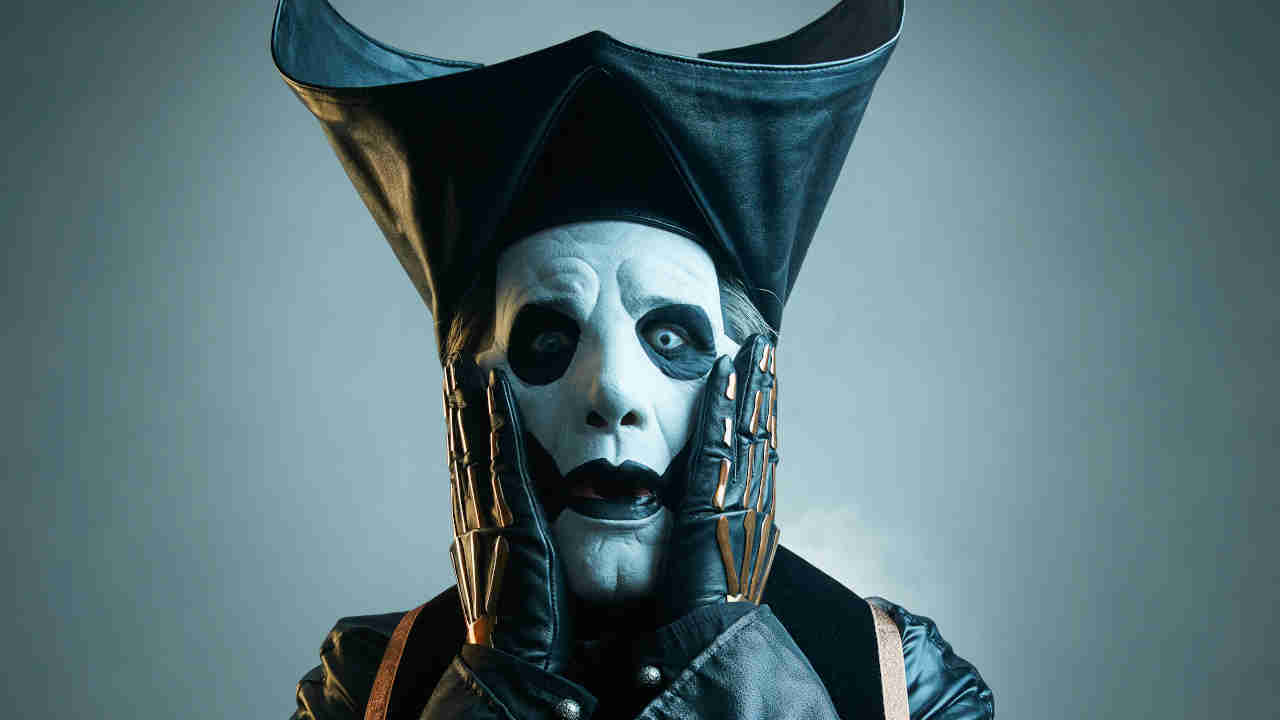
It’s been nearly 10 years to the day since Ghost first played Seattle, at the 800-capacity El Corazón, just a few blocks up the road. The capacity of tomorrow night’s venue – the Climate Pledge Arena – is 17,000. While the gig is not a sellout (Covid hesitancy has shuttered significant numbers of businesses and cast an eerie, desolated pall across the city), it underscores how unbelievably far the band have come in that time. The tour ends in Anaheim in March, and after a month off, the band will head to Europe. By then, Impera will finally have been released. As we sit here surrounded by photos of rock’s biggest icons, we ask which band’s trajectory Tobias would most like to emulate.
“If there’s a comparison to make, it’s better for us to compare ourselves to more contemporary bands rather than my idols,” he says. “All those 60s bands, it feels like they were 100 years ago now, with a completely different set of rules and a different world. But even talking about AC/DC, Metallica or Iron Maiden, it was a different time and age. But if I compare us to a band that’s at least a little bit closer to me, generationally, it would be Rammstein. I have no intention of sounding like them, but as a visionary, it’s motivating for me to see how a band that were doing arenas up until a couple of years ago now play stadiums. Remember that it’s one thing to play arenas, and it’s another thing to sell out arenas. They’re also a fictional sort of band, highly themed, and they put on a show, as opposed to Pearl Jam, who go up in normal street-wear and play on a carpet, and who seem like your down-to-earth, well-educated bros. Ha ha! So I’d see Rammstein as the sort of guidepost that I’m working towards.”
It’s at this point that Tobias drops an absolute bomb that’s sure to send Ghost’s devoted into fits of pure rapture. “I never go into an album production with just an empty white paper. There are always bits and pieces of paper that I’ve left behind. Little scraps. On my phone there are little ideas and stuff that I collect all the time. Everything I’m doing now is for the next record; I have a vague idea what that will be like, and a vague idea of the title and the colour scheme.”
And Ghost Chapter VI may not be that far off… “Now I have to go back into work mode. We’re just on the brink of the album cycle, but the way that I see it is that this album cycle is going to connect back-to-back on the next one, because now I know that I already have another record in me that I want to make,” he says. “What happens after that, I can’t say…”
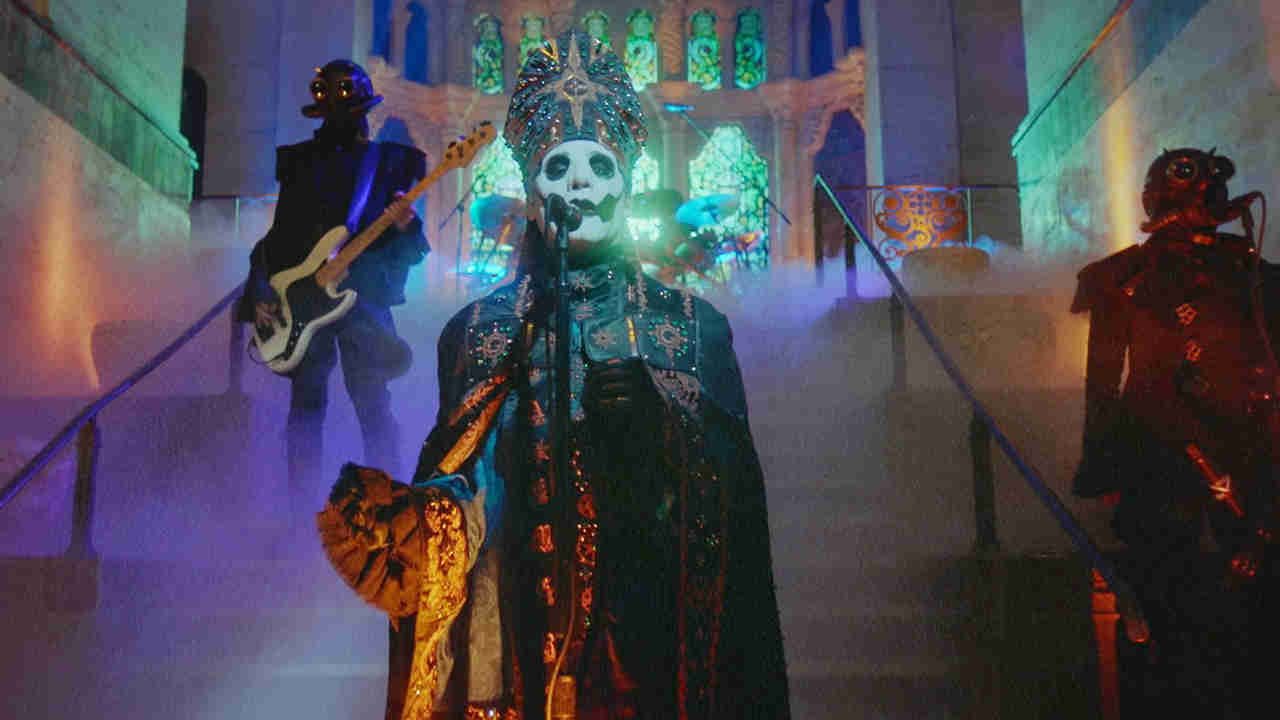
The next night, a rowdy legion of fans have amassed around Seattle’s Climate Pledge Arena long before gates open at 6pm. There’s a sea of metallers, of course, and a significant number of super-fans dressed up in all manner of facepaint and clerical garb. Even though the temperature hovers around a chilly 6°C, there’s a gloriously festive air about it all. Inside, an electrifying party vibe radiates throughout the venue, from merch lines to beer stands to the pit. After well-received sets from Twin Temple and Volbeat, a white curtain conceals Ghost as they open with the strains of Imperium.
The curtain falls and the Ghouls – dressed in dark, fitted worksuits and Victorian-era gas masks – storm to the front of the stage and rip into Kaisarion with an air of unstoppable might. The venue positively erupts when Papa Emeritus IV finally appears, and it’s hard for a moment to reconcile the painted showman whipping the throng to fever pitch with the laid-back dude in an Iron Maiden shirt, chilling out at the Edgewater last night.
They run through a belter-heavy set that draws from all of their LPs, as well as Mary On A Cross and their cover of Enter Sandman. Papa chats liberally between songs, effusively thanking the fans and the arena staff, straight through to the popcorn makers, for making it all happen. And he bloody well means every word of it. Though it’s only the second night of the tour, the band have never sounded tighter, with Papa backed by seven Ghouls, including two back-up singers. There are wardrobe changes, an elaborate cathedral-themed set, giant explosions of confetti from the ceiling and enough eyebrow-singeing pyro to render the name of the Climate Pledge Arena somewhat ironic.
Impera is still six weeks from dropping and Ghost have split their usual performance time tonight with Volbeat, so it’s safe to assume that the utterly exhilarating spectacle that has just reduced us to a hoarse and sweaty mess represents only a small taste of what lies ahead for Ghost fans this year.
As the band’s profile continues to soar, so too do the expectations of people attending their jaw-dropping live show. As the year progresses, fans can expect increasingly more spectacular production in the band’s live performances. “Without denigrating what we’re doing right now, obviously this is a co-headline tour, which means that both bands are doing bits of what we want to do,” Tobias explains. “What we’re doing on this tour now is going to expand as we go into the future. I can’t tell you specifically, and unfortunately most of my ideas tend to cost a lot to pull off, but I have a lot of ideas and hopefully we can tick a few of these off the bucket list on this tour cycle.”
Back in Seattle’s area tonight, they close with a riotous, pyro-studded Squarehammer. If this is Ghost running at half power, then perhaps those stadium gigs off in the distance are actually much closer than they appear.
